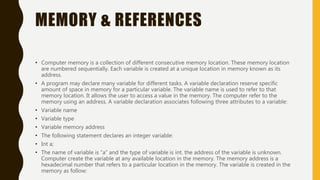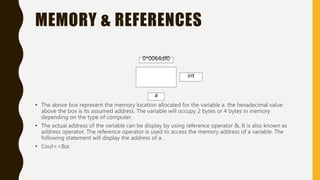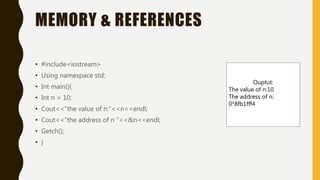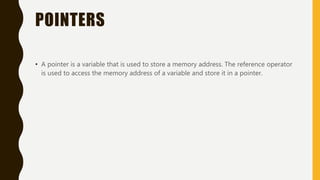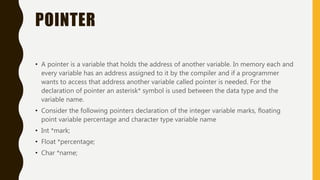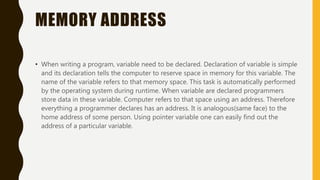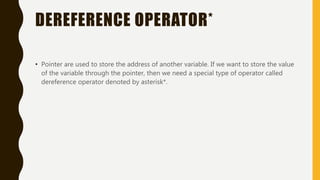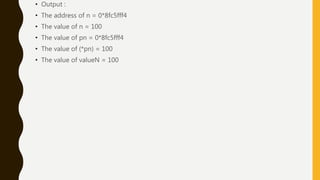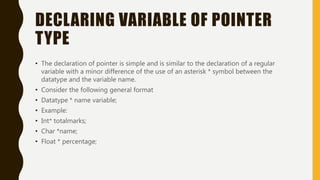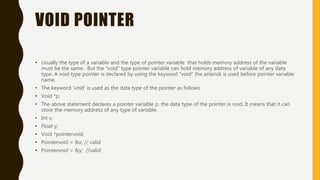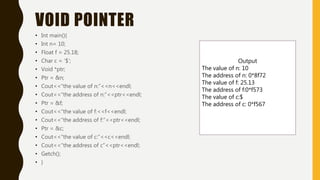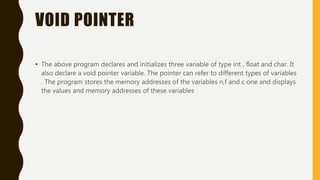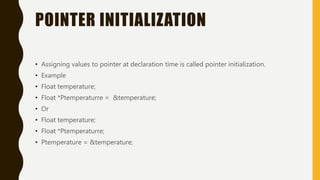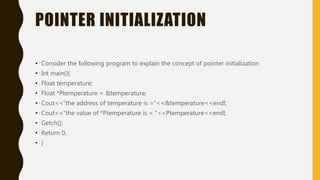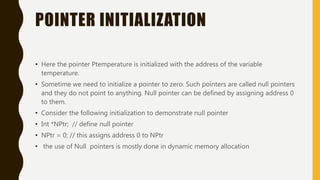Used of Pointer in C++ Programming
- 1. POINTER U N I T 7 A U T H O R : A B D U L L A H J A N
- 2. MEMORY & REFERENCES • Computer memory is a collection of different consecutive memory location. These memory location are numbered sequentially. Each variable is created at a unique location in memory known as its address. • A program may declare many variable for different tasks. A variable declaration reserve specific amount of space in memory for a particular variable. The variable name is used to refer to that memory location. It allows the user to access a value in the memory. The computer refer to the memory using an address. A variable declaration associates following three attributes to a variable: • Variable name • Variable type • Variable memory address • The following statement declares an integer variable: • Int a; • The name of variable is “a” and the type of variable is int. the address of the variable is unknown. Computer create the variable at any available location in the memory. The memory address is a hexadecimal number that refers to a particular location in the memory. The variable is created in the memory as follow:
- 3. MEMORY & REFERENCES • The above box represent the memory location allocated for the variable a. the hexadecimal value above the box is its assumed address. The variable will occupy 2 bytes or 4 bytes in memory depending on the type of computer. • The actual address of the variable can be display by using reference operator &. It is also known as address operator. The reference operator is used to access the memory address of a variable. The following statement will display the address of a . • Cout<<&a; int a 0*0064df0
- 4. MEMORY & REFERENCES • #include<iostream> • Using namespace std; • Int main(){ • Int n = 10; • Cout<<“the value of n:”<<n<<endl; • Cout<<“the address of n “<<&n<<endl; • Getch(); • } Ouptut: The value of n:10 The address of n: 0*8fb1fff4
- 5. POINTERS • A pointer is a variable that is used to store a memory address. The reference operator is used to access the memory address of a variable and store it in a pointer.
- 6. POINTER • A pointer is a variable that holds the address of another variable. In memory each and every variable has an address assigned to it by the compiler and if a programmer wants to access that address another variable called pointer is needed. For the declaration of pointer an asterisk* symbol is used between the data type and the variable name. • Consider the following pointers declaration of the integer variable marks, floating point variable percentage and character type variable name • Int *mark; • Float *percentage; • Char *name;
- 7. MEMORY ADDRESS • When writing a program, variable need to be declared. Declaration of variable is simple and its declaration tells the computer to reserve space in memory for this variable. The name of the variable refers to that memory space. This task is automatically performed by the operating system during runtime. When variable are declared programmers store data in these variable. Computer refers to that space using an address. Therefore everything a programmer declares has an address. It is analogous(same face) to the home address of some person. Using pointer variable one can easily find out the address of a particular variable.
- 8. REFERENCE OPERATOR & • As pointers are the variable which hold the addresses of other variable therefore while assigning addresses to them a programmer needs a special type of operator called address-of operator that is denoted by ampersand & symbol. This provides address of a memory location. • To understand it consider the following segment of code • Float x = 55; • Float *fpointer; • fPointer = &x; //assign address of x to pointer 1000 5.5 xfpointer
- 9. • Consider the following program • Int main(){ • Float x = 55; • Float *fPointer; • fPointer = &x; • Cout<<“the address of x = “<<&x<<endl; • Cout<<“the value of x = “<<x<<endl; • Cout<<“the value of fPointer =“<<fpointer; • Getch(); • Return 0; • } • Ouptut : • The address of x = 1000 • The value of x = 5.5 • The value of fPointer = 1000 • This program gives some other output (address) on another computer depending upon the availability of the memory
- 10. DEREFERENCE OPERATOR* • Pointer are used to store the address of another variable. If we want to store the value of the variable through the pointer, then we need a special type of operator called dereference operator denoted by asterisk*.
- 11. • Use of dereference (*) in a program • Int main(){ • Int n = 100; • Int *pn; //define a pointer to n • Pn = &n; //pn store the address of n • Int valueN; • ValueN = *Pn; • Cout<<“the address of n = “<<&n<<endl; • Cout<<“the value of n = “<<n<<endl; • Cout<<“the value of Pn = “<<Pn<<endl; • Cout<<“the value of *Pn = “<<(*pn)<<endl; • Cout<<“the value of value = “<<valueN; • Getch(); • Return 0; • }
- 12. • Output : • The address of n = 0*8fc5fff4 • The value of n = 100 • The value of pn = 0*8fc5fff4 • The value of (*pn) = 100 • The value of valueN = 100
- 13. DECLARING VARIABLE OF POINTER TYPE • The declaration of pointer is simple and is similar to the declaration of a regular variable with a minor difference of the use of an asterisk * symbol between the datatype and the variable name. • Consider the following general format • Datatype * name variable; • Example: • Int* totalmarks; • Char *name; • Float * percentage;
- 14. VOID POINTER • Usually the type of a variable and the type of pointer variable that holds memory address of the variable must be the same. But the “void” type pointer variable can hold memory address of variable of any data type. A void type pointer is declared by using the keyword “void” the asterisk is used before pointer variable name. • The keyword ‘void’ is used as the data type of the pointer as follows • Void *p; • The above statement declares a pointer variable p. the data type of the pointer is void. It means that it can store the memory address of any type of variable. • Int x; • Float y; • Void *pointervoid; • Pointervoid = &x; // valid • Pointervoid = &y; //valid
- 15. • In this segment of code pointerVoid store the address of both integer variable X and floating point variable Y , the compiler decides at run time that the address of which type of variable should be assigned to this pointer.
- 16. VOID POINTER • Int main(){ • Int n= 10; • Float f = 25.18; • Char c = ‘$’; • Void *ptr; • Ptr = &n; • Cout<<“the value of n:”<<n<<endl; • Cout<<“the address of n:”<<ptr<<endl; • Ptr = &f; • Cout<<“the value of f:<<f<<endl; • Cout<<“the address of f:”<<ptr<<endl; • Ptr = &c; • Cout<<“the value of c:”<<c<<endl; • Cout<<“the address of c”<<ptr<<endl; • Getch(); • } Output The value of n: 10 The address of n: 0*8f72 The value of f: 25.13 The address of f:0*f573 The value of c:$ The address of c: 0*f567
- 17. VOID POINTER • The above program declares and initializes three variable of type int , float and char. It also declare a void pointer variable. The pointer can refer to different types of variables . The program stores the memory addresses of the variables n,f and c one and displays the values and memory addresses of these variables
- 18. POINTER INITIALIZATION • Assigning values to pointer at declaration time is called pointer initialization. • Example • Float temperature; • Float *Ptemperaturre = &temperature; • Or • Float temperature; • Float *Ptemperaturre; • Ptemperature = &temperature;
- 19. POINTER INITIALIZATION • It should be considered that at the moment of declaring a pointer, the asterisk * indicates that it is a pointer variable and not the dereference operator.
- 20. POINTER INITIALIZATION • Consider the following program to explain the concept of pointer initialization • Int main(){ • Float temperature; • Float *Ptemperature = &temperature; • Cout<<“the address of temperature is =“<<&temperature<<endl; • Cout<<“the value of *Ptemperature is = “<<Ptemperature<<endl; • Getch(); • Return 0; • }
- 21. POINTER INITIALIZATION • Here the pointer Ptemperature is initialized with the address of the variable temperature. • Sometime we need to initialize a pointer to zero. Such pointers are called null pointers and they do not point to anything. Null pointer can be defined by assigning address 0 to them. • Consider the following initialization to demonstrate null pointer • Int *NPtr; // define null pointer • NPtr = 0; // this assigns address 0 to NPtr • the use of Null pointers is mostly done in dynamic memory allocation

